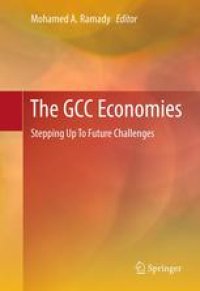
Ebook: The GCC Economies: Stepping Up To Future Challenges
- Tags: Economic Policy, Energy Policy Economics and Management
- Year: 2012
- Publisher: Springer-Verlag New York
- Edition: 1
- Language: English
- pdf
The ‘Arab Spring’ of 2011 has affected the countries of the region to varying degrees, including the Gulf Cooperation Council (GCC) members, comprising Saudi Arabia, Kuwait, Qatar, the United Arab Emirates, Oman and Bahrain. The GCC has become a significant regional bloc playing a vital economic and political role far beyond its shores, given its geopolitical strategic location, a preponderance of global energy reserves and a major international player through the use of accumulated financial reserves.
A new Gulf is rising, one that is more self assertive, looking to expand its membership to other Arab countries such as Jordan and Morocco, while at the same time strengthening the bloc’s relationship with current and emerging trading and strategic partners in Europe, USA and Asia.
Regional and international realities, especially the uncertainties unleashed by the ‘Arab Spring’, are forcing Gulf leadership to initiate new policies involving closer cooperation amongst GCC countries to address emerging challenges.
This volume brings together thirty renowned academics and specialists to examine a range of multifaceted social, political and economic issues facing the GCC in key areas such as:
· Diversification from a high dependency on a narrow hydrocarbon base
· Social transformation, youth employment and effective gender participation
· Outward and inward foreign direct investment flows
· Prospects for education reforms and e-learning.
· Sustainable security in oil, renewable energy (including nuclear) and food
· Corporate governance, transparency and enhancing the private sector's operating environment
· The role and governance of Gulf Sovereign Wealth Funds in investing their surpluses.
The volume also offers insights for challenges facing the GCC in monetary union, expanding the regional debt market and Sukuk issuance, GCC intellectual property rights application, detailed assessments of individual GCC country risk analysis, as well as the sustainability of long term government fiscal stimulus programs at the expense of private sector involvement.
The ‘Arab Spring’ of 2011 has affected the countries of the region to varying degrees, including the Gulf Cooperation Council (GCC) members, comprising Saudi Arabia, Kuwait, Qatar, the United Arab Emirates, Oman and Bahrain. The GCC has become a significant regional bloc playing a vital economic and political role far beyond its shores, given its geopolitical strategic location, a preponderance of global energy reserves and a major international player through the use of accumulated financial reserves.
A new Gulf is rising, one that is more self assertive, looking to expand its membership to other Arab countries such as Jordan and Morocco, while at the same time strengthening the bloc’s relationship with current and emerging trading and strategic partners in Europe, USA and Asia.
Regional and international realities, especially the uncertainties unleashed by the ‘Arab Spring’, are forcing Gulf leadership to initiate new policies involving closer cooperation amongst GCC countries to address emerging challenges.
This volume brings together thirty renowned academics and specialists to examine a range of multifaceted social, political and economic issues facing the GCC in key areas.
The ‘Arab Spring’ of 2011 has affected the countries of the region to varying degrees, including the Gulf Cooperation Council (GCC) members, comprising Saudi Arabia, Kuwait, Qatar, the United Arab Emirates, Oman and Bahrain. The GCC has become a significant regional bloc playing a vital economic and political role far beyond its shores, given its geopolitical strategic location, a preponderance of global energy reserves and a major international player through the use of accumulated financial reserves.
A new Gulf is rising, one that is more self assertive, looking to expand its membership to other Arab countries such as Jordan and Morocco, while at the same time strengthening the bloc’s relationship with current and emerging trading and strategic partners in Europe, USA and Asia.
Regional and international realities, especially the uncertainties unleashed by the ‘Arab Spring’, are forcing Gulf leadership to initiate new policies involving closer cooperation amongst GCC countries to address emerging challenges.
This volume brings together thirty renowned academics and specialists to examine a range of multifaceted social, political and economic issues facing the GCC in key areas.
Content:
Front Matter....Pages i-xlviii
Front Matter....Pages 1-1
Working for a Sustainable GCC Future: Reflections on Policies and Practices....Pages 3-10
Deepening the GCC Debt Markets: The Saudi Arabian Experience....Pages 11-20
GCC Economic Integration: Statistical Harmonization for an Effective Monetary Union....Pages 21-32
E-Learning in the Arab Gulf: Responding to the Changing World of Education....Pages 33-48
Front Matter....Pages 49-49
Energy Security in the EU from GCC Perspective....Pages 51-57
Going Nuclear in the GCC Countries: Rationale, Challenges, and Politics....Pages 59-68
Meeting the Renewable Energy and Sustainability Challenges in GCC Economies: Masdar Initiative Case Study....Pages 69-84
Food Security in the GCC Economies....Pages 85-98
Front Matter....Pages 99-99
GCC Country Risk Analysis....Pages 101-114
Macroeconomic Competitiveness of the GCC Economies....Pages 115-129
The GCC Intellectual Property Regimes: Global Harmonization or Regional Integration?....Pages 131-146
Economic Diversification in Saudi Arabia: The Need for Improving Competitiveness for Sustainable Development....Pages 147-156
Successful Outward Foreign Direct Investment: Saudi Lessons and Recommendations....Pages 157-164
Foreign Direct Investment in Saudi Arabia: A Competitiveness Analysis....Pages 165-174
Front Matter....Pages 175-175
Corporate Disclosure and Reporting Practices in the Gulf Cooperation Council (GCC) Countries....Pages 177-187
Corporate Governance Regulation: The Experience of Saudi Arabia....Pages 189-203
An Analysis of Entrepreneurship Characteristics in Saudi Arabia....Pages 205-215
The Dynamics of Entrepreneurial Motivation Among Women: A Comparative Study of Businesswomen in Saudi Arabia and Bahrain....Pages 217-227
Influencing Factors Model of Information and Communication Technology (ICT) in Saudi Arabian Small and Medium Enterprises (SMEs)....Pages 229-234
Front Matter....Pages 235-235
GCC Sovereign Wealth Funds: Challenges, Opportunities, and Issues Arising from Their Growing Presence on the Global Landscape....Pages 237-250
Front Matter....Pages 235-235
The Misconceptions Regarding the GCC Sovereign Wealth Funds....Pages 251-260
The Governance of Sovereign Wealth Funds from the GCC in an International Perspective....Pages 261-271
Putting Sovereign Wealth Funds to Good Use: Strategic Options for SWFs in the GCC Region....Pages 273-288
Back Matter....Pages 289-324